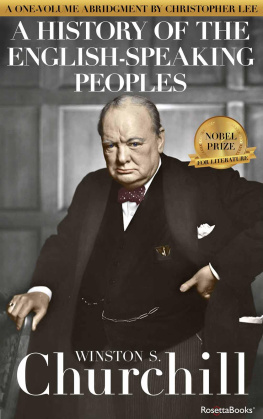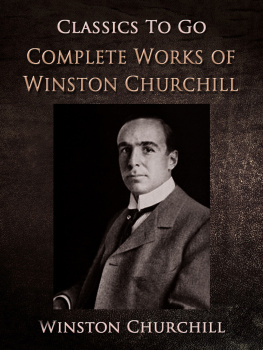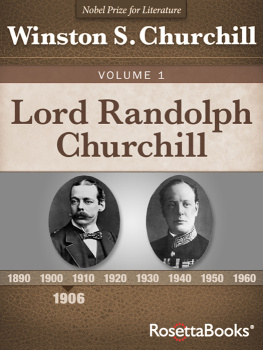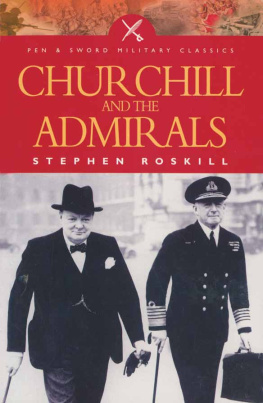
Table of Contents

ACKNOWLEDGMENTS
I DESIRE TO RECORD MY THANKS AGAIN TO MR F. W. DEAKIN AND Mr G. M. Young for their assistance before the Second World War in the preparation of this work; to Professor Asa Briggs of Leeds University, to Mr Maldwyn A. Jones of Manchester University, and to Mr Maurice Shock of University College, Oxford, who have since helped in its completion; and to Mr Alan Hodge, Mr Denis Kelly, Mr Anthony Montague Browne and Mr C. C. Wood. I have also to thank many others who have kindly read these pages and commented upon them.
For permission to include a quotation from The Oxford History of the United States acknowledgment is due to the Oxford University Press.
INTRODUCTION
THE GREAT DEMOCRACIES, THE FOURTH VOLUME OF WINSTON Churchills A History of the English-Speaking Peoples, was the last volume in his long literary career. This fact by itself, however, would make it unworthy of study. What makes it valuable is that it serves as a distillation of Churchills political thinking and vision, especially in regards to his belief that there existed fundamental ties, cultural and political, among the English-speaking peoples. As a work of history, this volume covers the period from the end of the Napoleonic Wars in 1815 to the end of the South African or Boer War in 1902, and explores the development of six English-speaking societies: Great Britain, Australia, New Zealand, Canada, South Africa, and the United States as they advance towards democracy. Churchills emphasis, however, is on Great Britain and the United States as central to progress and freedom in the world and the essential unity between the two societies. Readers aware of the current special relationship between Great Britain and the United States will find in Churchills treatment of nineteenth-century Anglo-American history the origins of this relationship. Moreover, reading this volume will also introduce to readers aspects of Churchillian philosophy that guided his actions as a participant in world affairs. Two, in particular, should be stressed at the outset. First, Churchill had a concrete philosophy of historical change: He believed in the inexorable progress of mankind and that this progress was best guided by peaceable change and reform in society rather than by violent revolution. Second, underscoring Churchills romantic temperament as a man attracted by action and adventure, he believed in the active role played by great men in which the outcome of events is determined by the heroism and courage of individuals. Finally, readers will see narrative and philosophy are presented in The Great Democracies through Churchills considerable writing skill. This skill included allusiveness, subtle insight into human character, a briskness in pace, a shrewd use of analogy and simile, and an ability to be vivid and to stimulate the reader.
Winston Churchill (1874-1965) is best remembered as one of the leading political figures of the twentieth century. Through a long political career that extended from 1900 to 1964, he achieved high-level positions in the British Cabinet, including serving as First Lord of the Admiralty during both World Wars as well as Chancellor of the Exchequer (a rough equivalent to the American position Secretary of the Treasury) from 1924 to 1929. Of course, Churchill reached his greatest fame as Prime Minister on two separate occasions, most memorably during the Second World War when his indomitable will and bulldog personality seemed to personify the British peoples will to survive and triumph over the Nazi threat. But Churchill also belonged to a select group of individuals, twentieth-century writer-politicians like: Theodore Roosevelt, Woodrow Wilson, Jawaharlal Nehru, Vladimir Lenin, Leon Trotsky, and Charles DeGaullepolitical figures who could also be regarded as distinguished for their literary gifts. In Churchills case, the full recognition of his literary skills came when he was awarded the Nobel Prize for Literature in 1953. His body of literature included journalism (London to Ladysmith, via Pretoria [1900], Ian Hamiltons March [1900]), essays about contemporaries (Great Contemporaries [1937]), memoirs (The World Crisis and the Aftermath [1923-31], My Early Life [1930], The Second World War [1948-54 ]), biographies (Lord Randolph Churchill [1906], Marlborough: His Life and Times [1933-38]), as well as A History of the English-Speaking Peoples. This last was published in two installments in 1957-58 with the fourth volume, The Great Democracies, published in the latter year, and had as its primary purpose the objective of reminding readers of the common heritage that connected peoples of the British Isles with the English-speaking peoples living in the Commonwealth, South Africa, or the United States. Churchill, himself, was half-American. His mother, Jennie Jerome, was the daughter of Leonard Jerome, a prominent New York financier, sportsman, and newspaper proprietor (he was part-owner of The New York Times). This American heritage helps to explain Churchills keen interest in American history and the emphasis given to it in The Great Democracies with its especially detailed account of the American Civil War. Churchill famously stated to the U.S. Congress in December 1941, I cannot help reflecting that if my father had been American and my mother British, instead of the other way round, I might have got here on my own, suggesting that he personified the shared heritage of the British and Americans. The Americans certainly recognized Churchills ties to the United States when they granted him honorary citizenship in 1963.
As a young man, Winston Churchill was much influenced by the titans of the eighteenth- and nineteenth-century British historical profession: Edward Gibbon and Thomas Macaulay. Churchill borrowed the stately and oracular writing style of Gibbon, the author of the multi-volume eighteenth-century masterpiece Decline and Fall of the Roman Empire. In addition, Gibbon, in his classic study of Ancient Rome, described the existence of an enlightened empire whose laws and traditions helped to civilize the Western world, arguably serving as a model for the later British Empire. Churchill learned from Macaulay, in History of England, a style that was incisive and forcible, as well as the historical philosophythe Whig philosophythat informed The Great Democracies. The Whig philosophy, as understood by historians, sees history as a process of mankinds development in which necessary, desirable ends are inescapably achieved. To Whigs like Macaulay (who could be seen as forerunners of Britains modern-day Liberals) such ends included the protection of life and liberty and the guaranteed pursuit of happiness.
Churchill saw Great Britain as playing a beneficent role in the world and accomplishing the goals of progress. A number of examples demonstrate this. In the context of the Congress of Vienna, the peace conference that concluded the Napoleonic Wars, Churchill saw the foreign policy of Viscount Castlereagh, the British Foreign Secretary, complemented by the armed might led by the Duke of Wellington as serving as a restraint upon the appetites of the Continental Powers. He noted, the moderating influence of Britain was the foundation of the peace of Europe. The role played by Great Britain at the Congress of Vienna in achieving and maintaining a balance of power in Europe helped to preserve the general peace of that continent for two generations. And after narrating a century of history in which
Next page









